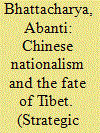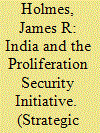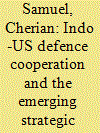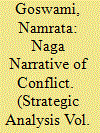| Srl | Item |
| 1 |
ID:
078669


|
|
|
|
|
| Publication |
2007.
|
| Summary/Abstract |
Chinese nationalism primarily represents Han nationalism and ignores ethnic minority sub-nationalisms and identities in the larger cause of the state's unity and integrity. The Chinese state calls for submerging of all minority identities within the predominant Han identity, for promoting national cohesion and nationalism, effectively precluding the possibility of the assertion of Tibetan nationalism and autonomy. Because of the suppression of Tibetans in China, a large number of them have fled and settled in India and elsewhere. The Tibetan movement for safeguarding their identity, culture and political space has grievously suffered as a result of Chinese nationalism and China's Tibet policy. The fate of Tibetan nationalism is, to a large extent, tied to the dynamics of the Sino-Indian relations and the course of the internal Tibetan politics and that of its relationship with the community in exile in the post-Dalai Lama era.
|
|
|
|
|
|
|
|
|
|
|
|
|
|
|
|
| 2 |
ID:
078673


|
|
|
|
|
| Publication |
2007.
|
| Summary/Abstract |
It is now generally accepted that energy security could be significantly enhanced through sustained cross-border exchanges in many regions. In South Asia, however, regional energy security cooperation has seriously remained entangled in geopolitics. The possibility of overexploitation of natural resources such as coal, natural gas and oil reserves and the low level of political confidence in sharing hydro resources have placed serious obstacles to enhancing the level of energy security in the region. This article looks at the bountiful opportunities that exist for South Asia to collectively harness diverse energy sources so as to increase the level of energy security in the region and thus sustain higher economic growth
|
|
|
|
|
|
|
|
|
|
|
|
|
|
|
|
| 3 |
ID:
078672


|
|
|
|
|
| Publication |
2007.
|
| Summary/Abstract |
The article considers why New Delhi has shied away from full participation in the US-led Proliferation Security Initiative despite compelling national interests in improving Indian maritime forces and cooperating with the United States at sea. Some factors examined are polarized domestic politics, Indians' ambivalence about non-proliferation arrangements that formerly targeted them, and New Delhi's desire for regional primacy. Until Indian leaders come to believe that the benefits of PSI participation outweigh its drawbacks, they will continue to hold the initiative at arm's length.
|
|
|
|
|
|
|
|
|
|
|
|
|
|
|
|
| 4 |
ID:
078668


|
|
|
|
|
| Publication |
2007.
|
| Summary/Abstract |
The most visible manifestation of a strategic relationship between two countries is cooperation in the defence sphere. When the Defence Framework Agreement was signed in June 2005, it was widely assumed that the Agreement provided a skeleton that would be fleshed out over a period of time. This article posits that many of the areas of cooperation identified in the Agreement are already "works in progress" and the forward momentum generated at both the political and military levels will only lead to closer defence relations provided the potential pitfalls are identified and avoided, and there is greater clarity on the end-goals of closer defence cooperation.
|
|
|
|
|
|
|
|
|
|
|
|
|
|
|
|
| 5 |
ID:
078671


|
|
|
|
|
| Publication |
2007.
|
| Summary/Abstract |
The Naga narrative of dissent is a longstanding issue afflicting India's Northeast. Though attempts are being made to resolve the issue through peaceful dialogue between the Union Government and the resistance groups, earlier peace agreements such as the Nine Point Hydari Agreement and the Shillong Accord failed to garner support from all the different Naga tribes. The local fault lines are also playing a destabilizing role in the current peace process with tribal loyalties transcending group loyalties. In this context, the article examines the Indo-Naga relations, the divide between the extremists and the moderates within the Naga movement. It also assesses the counter-discourse to the mainstream separatist discourse. Finally, the article critiques the idea of Naga "uniqueness" on which the resistance groups base their movement as well as indicates the significant "incompatibilities" between actors in order to draw out certain significant policy implications for a peaceful resolution of the issue
|
|
|
|
|
|
|
|
|
|
|
|
|
|
|
|
| 6 |
ID:
078674


|
|
|
|
|
| Publication |
2007.
|
| Summary/Abstract |
Navigational freedoms have increasingly come under restrictions because of ecological, economic and security concerns of coastal states. Fishing vessels, oil tankers, ships carrying ultra-hazardous nuclear cargoes and even military vessels have to conform to stringent international, regional and national regulations. Often there is a conflict of interest as maritime activities of one state can interfere with the efforts of others to utilise the sea. The Law of the Sea Convention was adopted to provide a balance among these competing interests. But new state practices have created challenges for the Convention that have to be better understood and dealt with. The balance between navigation and other national interests has continuously changed, and navigational freedoms appear to be disappearing during this evolutionary process
|
|
|
|
|
|
|
|
|
|
|
|
|
|
|
|
| 7 |
ID:
078670


|
|
|
|
|
| Publication |
2007.
|
| Summary/Abstract |
In the European security calculus, terrorism has become one of the key strategic threats. Alarmingly, the continent has also become a centre of radical Islamist propaganda and activism, with a number of European countries worried over the potential of their own 'home-grown' religious extremists. Latest studies indicate a disturbing trend of a section of the youth, generally belonging to the Muslim communities of West African and South Asian origin from a poor or middle class socioeconomic background, embracing extremism and terrorism in Europe. This article examines the agenda of some prominent radical Islamic organisations, namely, 'Hizb ut-Tahrir' and 'Al-Muhajiroun', active in Europe, which also have South Asia in their focus. Taking advantage of the communications revolution, these organisations have succeeded in establishing an effective propaganda network. A silent radicalisation of young Muslims in Europe is also influencing Muslim youth in the subcontinent because of the inter-linkages and continuous propaganda established through the Internet
|
|
|
|
|
|
|
|
|
|
|
|
|
|
|
|